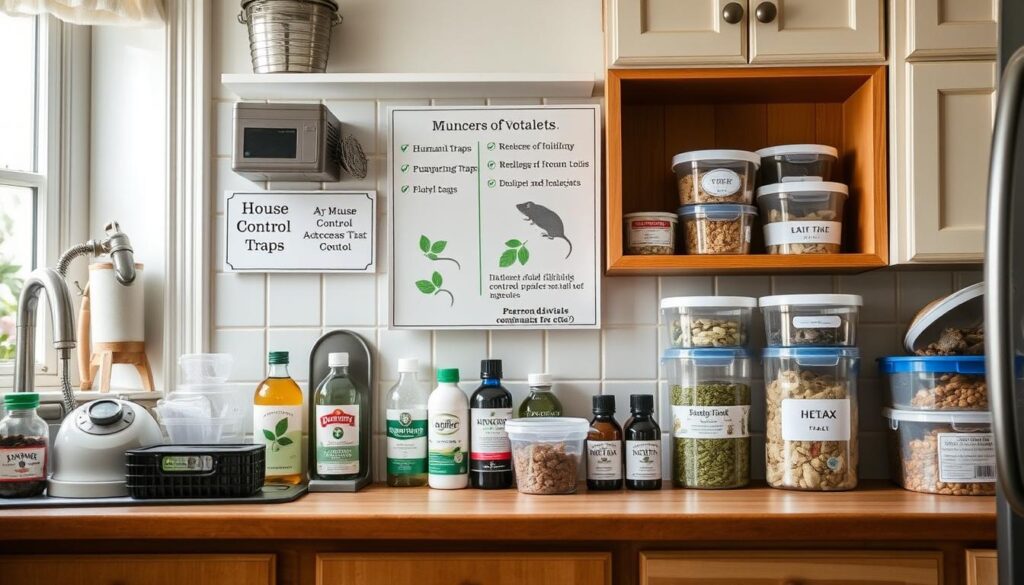If you’ve faced mouse problems in your space, you’re in good company. Many homeowners deal with mice moving in, which can harm them and their homes. In this guide, we’ll show how to oust these pests. We’ll cover the basics of mouse control and give tips on getting rid of them. Let’s tackle these unwelcome guests together.
Table of Contents
ToggleKey Takeaways
- Mouse control is essential for maintaining a safe home environment.
- Health risks associated with mouse infestations are significant.
- Identifying entry points is crucial in effective pest control.
- Utilizing traps and repellents can greatly assist in mouse extermination.
- Keeping food properly stored will help deter mice from invading.
- Professional pest control may be necessary in severe cases.
Understanding the Mouse Problem
Mice can cause significant challenges in a home. It starts with recognizing the signs of mice. Early detection helps homeowners take action before it gets worse. Knowing about mice, their behavior, habits, and breeding is key for control.
Signs of a Mouse Infestation
Early detection of mice is crucial. Here are signs to look out for:
- Droppings found in areas where food is kept
- Gnaw marks on furniture or walls
- A persistent scratching or scurrying noise particularly at night
- Nests made from shredded paper, fabric, or insulation
- Footprints or trails in dusty areas
The Biology of Mice
Mice are notably adaptable, making control challenging. They are small, move quickly, and reproduce rapidly. A single female can have many babies a year. This can quickly turn a small issue into a big infestation.
Mice are mostly active at night, making them hard to spot. They look for food, water, and shelter in homes. Understanding their biology is crucial for effective control measures.
| Sign of Infestation | Description | Action Required |
|---|---|---|
| Droppings | Dark pellets found near food sources | Clean area thoroughly and store food properly |
| Gnaw Marks | Scraped surfaces on food packaging and furniture | Inspect and seal potential entry points |
| Scratching Noises | Sounds coming from walls or attics overnight | Consider traps or consult professional pest control |
| Nests | Made from scraps found around the house | Locate and remove nests |
| Footprints | Small imprints in dust or dirt | Monitor with traps or bait stations |
Why Rodent Control is Important
Mice can pose serious threats to both health and finances. This highlights the urgent need for effective rodent control. Dealing with a mouse problem means recognizing the health risks. It’s also about understanding the financial issues that can arise. If you are looking for the best Website, you can Visit here for more information: 除老鼠
The Health Risks of Mice
Mice can carry diseases that harm human health. Some of the health risks from mice include:
- Hantavirus: This can be caught from mouse droppings, urine, or saliva, leading to severe respiratory issues.
- Leptospirosis: You can get this bacterial infection from water tainted by rodent urine.
- Salmonella: Mice spread this bacteria, which can contaminate food and surfaces.
Financial Implications of an Infestation
The costs of a mouse infestation can add up quickly. Homeowners may face several expenses:
| Cost Type | Potential Expense |
|---|---|
| Property Damage | $100 – $10,000+ |
| Cleanup Costs | $200 – $1,500 |
| Professional Extermination | $200 – $2,000 |
Understanding the health dangers and financial costs of mice shows why good pest control is crucial. Taking quick action protects not just health but also money.
Getting Rid of Mice: The Best Practices
Understanding how mice enter your home is key to effective pest control. It’s crucial to know all entry points because mice can get through very small spaces. Watch out for:
Identifying Entry Points
- Cracks in walls and foundations
- Gaps around windows and doors
- Spaces where pipes and wires enter the building
Checking your home for these spots helps a lot in keeping mice out. Mice can use tiny openings, so you have to keep an eye out.
Sealing Your Home
After finding where mice can get in, you need to seal these spots. Use stuff like steel wool, caulk, and expanding foam. Here’s how you can seal them:
- Steel Wool: Stuff steel wool into big holes that mice can get through.
- Caulk: Use caulk to fill cracks along walls and windows.
- Expanding Foam: Ideal for large gaps and creates a strong barrier.
Sealing your home well is important for keeping mice out long-term. It lessens the chance of mice infestations and cuts down on pest control trips.

Mouse Traps: A Key Strategy
Using mouse traps is important for controlling pests in homes with mice. There are many types of traps to choose from. Each has its own benefits, making it easier to pick the right one for your needs.
Types of Mouse Traps
There are several mouse traps available:
- Snap Traps: These traditional traps kill mice quickly. They can be set up again for reuse.
- Glue Traps: These have a sticky surface that catches mice. It’s important to check them often to avoid suffering.
- Electronic Traps: These give mice a fast, lethal electric shock. They’re simple to use and no direct contact is needed.
How to Properly Use Mouse Traps
To use mouse traps effectively, good placement and baiting are key. Follow these steps:
- Find where mice walk a lot, like food areas, walls, and corners.
- Place traps along the wall to catch mice from both sides.
- Choose tasty bait, like peanut butter or chocolate, for the traps.
- Regularly check the traps and clean them to keep things hygienic and efficient.
Mouse Poisons: When and How to Use Them
Mouse poisons, also known as rodenticides, are key in fighting pests. Knowing about them and how to use them safely matters a lot. This can really help in dealing with mice effectively.
Types of Rodenticides
There are mainly two types of rodenticides: anticoagulants and non-anticoagulants. They both work differently to control mice.
| Type | Mechanism of Action | Example Products |
|---|---|---|
| Anticoagulants | Causes internal bleeding by preventing blood clotting over a series of days. | Ratsak, D-Con |
| Non-Anticoagulants | Acts quickly to cause death, often through neurotoxicity or dehydration. | Fumitoxin, Bromethalin |
Safety Precautions with Mouse Poisons
Even though mouse poisons work well, being safe is crucial. It’s important to avoid danger to both pets and kids. Here are some steps to keep in mind:
- Always read the label carefully for instructions and dosage information.
- Store all rodenticides out of reach of children and pets.
- Use tamper-resistant bait stations to minimize accidental exposure.
- Monitor treated areas frequently and dispose of any dead rodent remains properly.
Natural Mouse Repellents
Homeowners looking for safe pest control can use natural mouse repellents. Using essential oils and homemade mixtures makes homes less inviting to mice. This minimizes the need for harmful chemicals.
Essential Oils and Their Effectiveness
Essential oils are great at keeping mice away. Peppermint, citronella, and eucalyptus oils are very effective. Their strong smells interfere with mice’s sense of smell.
This makes areas less appealing to them. Here’s how well they work:
| Essential Oil | Repelling Factor | Application Tips |
|---|---|---|
| Peppermint | Highly effective for short-term repelling | Soak cotton balls in oil and place in entry points |
| Citronella | Long-lasting effect | Combine with water in a spray bottle and apply |
| Eucalyptus | Strong scent masks food odors | Mix with water and spray around affected areas |
Homemade Repellent Solutions
Making homemade repellents is easy and cheap. Homeowners can try these recipes:
- Peppermint Oil Spray: Mix 10-15 drops of peppermint oil with water in a spray bottle. Spray in areas where mice enter and where they are found.
- Cayenne Pepper Powder: Use cayenne pepper near mouse paths or homes. Its spicy smell keeps mice away but is safe for humans.
- Vinegar and Water Mix: Mix vinegar and water equally. Spray it where mice might be.

Mouse Prevention Techniques
To keep mice away, working on certain strategies is important. Start by cleaning your home well and storing food the right way. These steps are key in keeping pests out.
Keeping Your Home Clean
Keeping your home clean is a big part of stopping mice. Cleaning often can show hiding places and make your home less inviting to mice. Here’s what you can do:
- Declutter the living areas to eliminate potential nesting materials.
- Regularly vacuum and sweep floors, especially in corners and under furniture.
- Wipe down surfaces to remove crumbs and food residues.
- Seal any cracks or holes in walls and baseboards to limit entry points.
Food Storage Tips to Avoid Mice
How you store your food can prevent mice. Mice look for easy food, so storing your food properly can stop them. Try these food storage methods:
- Use airtight containers for all dry goods, pantry items, and leftovers.
- Keep food items stored in the refrigerator and freezer whenever possible.
- Dispose of trash regularly and use sealed bins to deter pests.
- Store pet food in sealed containers and avoid leaving it out overnight.
Mouse Deterrents: Technology and Tools
Modern technology boosts our fight against pests. Ultrasonic pest repellers are now a favorite tool against mice. These devices make a high-pitched sound that mice hate but we can’t hear.
This sound makes mice want to leave the area. It’s a smart way to keep them away without harm.
Ultrasonic Pest Repellers
Ultrasonic repellers are a safe choice for getting rid of mice. They work by plugging into an outlet and making sounds that bother mice’s ears. Studies have found that these sounds can keep mice from wanting to stay in our homes.
Other Innovative Deterrent Options
There are other cool tools to fight mice, besides ultrasonic repellers:
- Motion-Activated Devices: These gadgets make noise or light up if they sense movement, scaring rodents.
- Visual Deterrents: Things like shiny tapes or stickers can make mice feel unwelcome.
- Natural Ingredients: Some scents, like peppermint oil, are great for keeping mice away if used correctly.
Using these advanced tools can make your mouse-fighting strategy even stronger. It’s like building a fortress mice can’t breach.
| Deterrent Type | Mechanism | Effectiveness |
|---|---|---|
| Ultrasonic Pest Repellers | Emits high-frequency sound waves | Effective, especially with consistent use |
| Motion-Activated Devices | Activates with movement, produces sound/light | Good for immediate deterrence |
| Visual Deterrents | Uses light and reflection | Varies; works as a combined strategy |
| Natural Repellent Ingredients | Smells that repel mice | Moderately effective; dependent on application |
When to Call for Professional Pest Control
Determining the right time to hire professional pest control is key to a healthy home. DIY methods work for small problems, but some cases need an exterminator’s skills. Spotting the signs of infestation early helps you act fast.
Signs You Need an Exterminator
- Visible mice or droppings in living areas
- Noises from walls or ceilings, especially at night
- Extensive damage to food packaging or household items
- Recurring sightings despite previous attempts to eliminate them
The Benefits of Professional Help
Professional pest control offers many benefits. The experts have the right tools, know-how, and methods to handle big infestations. When you choose professional pest control, you get:
- Advanced products and treatment options
- A comprehensive evaluation of the situation
- Targeted treatments that focus on specific rodent behaviors
- Long-term strategies to keep pests away
Conclusion
Getting rid of mice is key to keeping your home safe and healthy. We’ve looked at many ways to tackle this problem. From finding where they get in, to using traps and natural ways to keep them out. Each method helps make your home a place where pests can’t stay.
Keeping your home clean and food stored safely helps prevent mice. It’s important to act before there’s a problem, not just after. If things get too tough, getting help from professionals is a smart move. They offer specific advice to make your efforts against mice even stronger.
Using what you’ve learned from this article can make your home mice-free. This brings peace of mind. With hard work and the right steps, living without pests is possible. This makes your home healthier and happier for everyone.
FAQ
What are the best ways to get rid of mice in my home?
To eliminate mice, start by sealing their entry points. Use mouse traps and apply mouse poisons carefully. Mouse repellents can also be effective.
Keep your home clean and inspect regularly. This will help prevent mice in the long run.
How do I know if I have a mouse infestation?
If you find mouse droppings or gnaw marks, you might have an infestation. Hearing noises inside the walls or attic is another sign.
Look for nests in your home, too. They often use insulation or paper to build them.
What are some effective mouse deterrents I can use?
You can try ultrasonic pest repellers. Natural repellents, like peppermint oil, are also good to keep mice away.
These methods make your home less appealing to mice. They work well with other strategies.
When is it appropriate to use mouse poisons?
Use mouse poisons only for severe infestations. You must be careful, especially if kids or pets are around. Place them where only mice can get to them.
How can I prevent mice from entering my home?
To prevent mice, seal any cracks and cover gaps. Store food in secure containers.
Keeping your house tidy and clutter-free also deters mice.
What types of mouse traps are available?
There are snap traps, glue traps, and electronic traps. Each type works differently.
Pick one that suits your situation best. Make sure to follow the directions for use.
Should I hire a professional pest control service for mouse extermination?
If DIY methods fail or the infestation is bad, consider professional help. Experts use advanced techniques and products for effective extermination.













